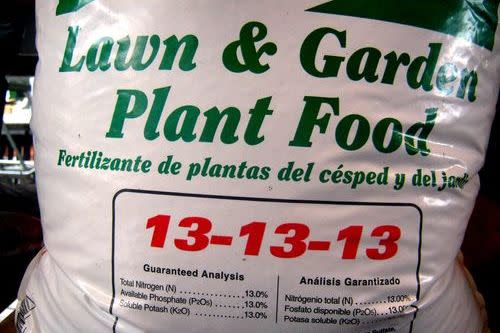7 Dumb Ways to Feed Your Lawn

Now that homeowners across the South are just about finished butchering their crepe myrtles for the year, they're turning their attention to another dumb thing they shouldn't do -- fertilizing their grass at the wrong time.
Grumpy realizes that many vocal lawn-haters out there don't want you to fertilize ever, because you shouldn't have a lawn ever. To them I say, it's your yard and this is America -- do what you want. Plant a wilderness. Fill a swamp. Artistically arrange rocks.
But this doesn't help the millions of decent, law-abiding lawn-lovers who need to and want to fertilize correctly. So here's Grumpy's list of lawn fertilizing DON'TS for early spring.

Look for phosphorus-free lawn fertilizer this spring. It cuts down on water pollution.
DON'T apply fertilizer that's high in phosphorus. Phosphorus washing into lakes and rivers can result in the explosive growth of algae. As algae die, a process called eutrophication robs the water of oxygen and kills fish. Besides, most lawns already have all the phosphorus they need. To find how much phosphorus a bag of fertilizer contains, look for the middle number in the three-number analysis on the label. A bag of 18-24-10 contains 24% phosphorus. Many major fertilizer companies, such as Scott's, have committed to totally eliminating phosphorus (P) from all lawn fertilizers by the end of this year. Good.

Triple-13 fertilizer is cheapo crapola that should not be used on lawns.
DON'T use cheap, quick-release fertilizers like 13-13-13. Sure, it costs about half of the brand names, but its nutrients run off after a heavy rain and don't feed for long. Brand names contain more slow-release nitrogen, the most important nutrient for lawns, so they feed longer and pollute less. And 13-13-13 contains 13% phosphorus, a nutrient we promised we weren't going to apply anymore, remember?
DON'T fertilize dormant grass. Grass uses nitrogen for making grass blades, but if it's not growing yet, you're wasting your money and also adding to groundwater pollution. In the South, where we grow warm-weather grass, it's easy to tell when the lawn is dormant. It's brown. Wait until it greens up. Farther north where grass stays green in winter, it's a bit trickier. Wait to fertilize until after the ground thaws or you see spring trees and shrubs blooming.
DON'T use fertilizer to melt snow and ice on sidewalks. Snow melt will carry nitrogen from the fertilizer into groundwater and storm drains.
DON'T get fertilizer on sidewalks, driveways, and other pavement. Rain will quickly wash it into the gutter, storm drains, and water bodies. Sweep any stray fertilizer back into the grass. Healthy lawns do a very good job of holding onto fertilizer particles, even during heavy rain.
DON'T fertilize more often than necessary. For warm-season grasses, fertilize once in spring and once in summer. For cool-season grasses, fertilize once in spring and once in fall. And use a mulching mower to return clippings to the lawn. Not only does this keep lawn clippings out of landfills, but it also reduces the need for fertilizer and improves the soil's biological activity.
DON'T use weed-and-feed in early spring. It only works on actively growing weeds (and even then, not too well). Apply it too early and all you'll do is feed the weeds.
Phunny Phosphorus Story!!!!
Think about it. What other blog could you read that offers you a humorous anecdote about phosphorus? That's why "The Grumpy Gardener" remains the World's #1 Blog, as tabulated in a formal poll conducted last week by Grumpy himself.
The story: Many years ago, former Southern Living Garden Editor Lois Chaplin was writing an article about ways to improve your soil and give it the right balance of plant nutrients. One of those nutrients is phosphorus, which we gardening cognoscenti shorten to "P." When Lois began a sentence, "If your soil has too much P," our copy editor, Louise, nearly had a stroke. Louise was terrified that readers might infer that heathens were relieving themselves in the garden.
Just so you know -- no one connected to Southern Living has ever relieved themselves anywhere. We hold it from birth until we explode.
